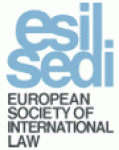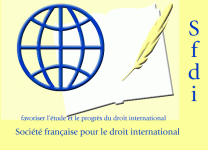Organisationen
Hier finden Sie eine Liste mit anderen Forschungsgemeinschaften zum Völkerrecht.
A

American Society of International Law
ASIL is a nonprofit, nonpartisan, educational membership organization founded in 1906 and chartered by Congress in 1950. ASIL holds Category II Consultative Status to the Economic and Social Council of the United Nations and is a constituent society of the American Council of Learned Societies. The Society is headquartered at Tillar House in Washington, D.C. The Society’s 4,000 members from nearly 100 nations include attorneys, academics, corporate counsel, judges, representatives of governments and nongovernmental organizations, international civil servants, students and others interested in international law. Through our meetings, publications, information services and outreach programs, ASIL advances international law scholarship and education for international law professionals as well as for broader policy-making audiences and the public.
Asian Society of International Law
The Asian Society of International Law (AsianSIL) is an international non-partisan, non-profit and non-governmental organization with the following objectives:
- To promote research, education and practice of international law by serving as a centre of activities among international law scholars and practitioners in Asia and elsewhere, in a spirit of partnership with other relevant international, regional and national societies and organizations;
- To foster and encourage Asian perspectives of international law; and
- To promote awareness of and respect for international law in Asia.
To these ends, the functions of the Society include organizing conferences, regional and subregional seminars, workshops and other meetings; undertaking publication for the Society, including the proceedings of the conference organized by the Society; and collecting and disseminating information relating to research, academic activities and other developments relevant to Asia in the field of international law.
There are currently three chapters of the AsianSIL. They are the Japan Chapter of the Asian Society of International Law, the Malaysian Chapter of the Asian Society of International Law and the Indonesian Society of International Law.
Australian and New Zealand Society for International Law
ANZSIL, the Australian and New Zealand Society of
International Law, brings together the region’s leading thinkers
and practitioners in all spheres of international law.
ANZSIL was established in 1992 with the aims of:
- Developing and promoting the discipline of international law.
- Supporting the teaching of international law.
- Providing a forum for academics, government lawyers, NGOs, students and practitioners of international law to discuss research and issues of practice in international law.
- Increasing public awareness and understanding of international law.
- Liaising with other bodies in promoting any of these objects.
The principal activity of ANZSIL in furtherance of these aims is the convening of an annual conference.
The ANZSIL conference, held in Canberra or Wellington, has established itself as the principal forum for international lawyers in Australia and New Zealand.
B

British Institute of International and Comparative Law
The British Institute of International and Comparative Law continues a mission first begun in 1895: to advance the understanding of international and comparative law; to promote the rule of law in international affairs; and to promote their application through research, publications and events.
As an independent legal research institute with charitable status, unaffiliated to any university, the Institute is the only body of its sort in the UK. The Institute creates a diverse community of scholars and practitioners and serves as an unrivalled focal point for its substantial membership base.
C

Canadian Council on International Law
The Canadian Council on International Law (CCIL) was established in 1972 in order to promote the co-operative study and analysis of international legal problems by scholars in universities and by professionals in government service and private practice.
D
E

European Society of International Law
The vital role of law in responding to processes of globalization, and the growing importance of developing a shared understanding within Europe in relation to a wide range of international legal issues, underscore the need for a forum that will facilitate greater interaction among European international lawyers. This is demonstrated by recent debates over issues ranging from the war in Iraq and the debate over the appropriate limits of international intervention, through the resolution of international trade disputes and the shape of the future international economic regime, to the role of multilateralism in general. These and many other issues have emphasised the desirability of developing much closer links between those working in the international law field in Western Europe and their counterparts in Eastern and Central Europe.
This need will be all the more marked in response to the expansion of membership of the European Union and the proposed adoption of institutional arrangements designed to enhance Europe’s voice in international affairs. This evolution in EU law and practice should be complemented and reinforced by the emergence of an increasingly integrated community of European international lawyers.
Against this background, the stated goals of the ESIL are to contribute to the rule of law in international relations and to promote the study of public international law. For these purposes its Constitution provides that it will:
- organise and support in-depth exchanges of ideas on matters of common interest to international lawyers in Europe and elsewhere;
- encourage high-level scholarship and analysis;
- provide a forum for European-wide discussions, and foster the involvement and representation of younger scholars;
- promote a greater awareness and understanding of international law not only amongst lawyers but within the general public; and
- foster a greater appreciation of the role of the European tradition and develop European perspectives in international law.
F

French Society of International Law
Founded in 1967 in Strasbourg (France), the French Society for International Law (SFDI) is a French non-profit association dedicated to the study and progress of International Law. It is made up of a Bureau, a Council, honorary members, active members and student members. Initially, the Society brought 103 members together; nowadays, it has more than 550 members. Since 1970, among other activities, it organises an annual conference and study seminars.
G
German Branch of the International Law Association
Seit der Gründung im Jahre 1912 und der Neugründung Im Jahre 1951 finden sich in der Deutschen Vereinigung für Internationales Recht Wissenschaftler und Praktiker zusammen zum Informations- und Meinungsaustauasch und zu gemeinsam interessierenden Arbeiten sowie zur Vertretung der deutschen Wissenschaft und Praxis auf internationaler Ebene. Die behandelten Rechtsgebiete schließen das Völkerrecht, das Kollisionsrecht sowie die mit internationalen Bezügen befaßten Bereiche des Privatrechts, des öffentlichen Rechts und des Strafrechts ein. Zu den Mitgliedern gehören Direktoren wissenschaftlicher Institute, Universitätsprofessoren, Praktiker aus staatlichen und internationalen Institutionen, Privatunternehmen und der Anwaltschaft ebenso wie junge Wissenschaftler.
Der Informations- und Meinungsaustausch findet auf nationaler Ebene auf den jährlichen Mitgliederversammlungen mit wissenschaftlichem Programm im Heidelberger Max-Planck-Institut, auf internationaler Ebene auf den alle zwei Jahre in wechselnden Regionen der Welt aabgehaltenen Konferenzen der International Law Association (ILA) statt. Der Arbeit an konkreten Projekten, insbesondere wissenschaftlichen Berichten und Koordinationsentwürfen, widmen sich Ausschüsse der Vereinigung sowie vor allem Commitees der ILA, welche für besondere Rechtsgebiete aus Mitgliedern der verschiedenen nationalen Vereinigungen gebildet werden und an denen sich deutsche Wissenschaftler sehr aktiv beteiligen.
German Society for Military Law and the Law of War
Die Deutsche Gesellschaft für Wehrrecht und Humanitäres Völkerrecht e.V. (kurz: DGWHV) ist ein Forum der Zusammenarbeit für Beamte*) und Soldaten, Professoren, Assistenten und Studierende, Rechtsanwälte und Journalisten etc., die in unterschiedlicher Form mit Rechtsfragen der Sicherheitspolitik und des militärischen Dienstes zu tun haben.
Regelmäßige Tagungen und Vorträge dienen der Information und dem Austausch über aktuelle Rechtsentwicklungen. Beiträge und Ergebnisse dieser Veranstaltungen werden in juristischen Fachzeitschriften (Neue Zeitschrift für Wehrrecht, Europäische Wehrkunde, Revue de droit militaire et de droit de la guerre, Zeitschrift für ausländisches öffentliches Recht und Völkerrecht u.a.) oder in Buchform veröffentlicht. Darüber hinaus informiert der Vorstand in Rundbriefen regelmäßig über Aktivitäten der DGWHV und über aktuelle Gesetzgebungsvorhaben.
Die DGWHV ist Teil der Société Internationale de Droit militaire et de Droit de la Guerre / International Society for Military Law and the Law of War.
I
Indian Society of Internantional Law
The Indian Society of International Law (ISIL), a premier national institution for teaching, research and promotion of international law, was established in 1959. The objectives of the ISIL inter alia are:
- To foster nation-wide, the study and development of international law;
- To interpret through its forums and publications, the application of international law as chiefly affecting India;
- To encourage the comparative study of the application of international law in other states; and
- To promote research in international law.
International Law Association
The International Law Association has branches around the world and a growing membership of academics and practising professionals with an interest in international law. The main objectives of the Association are the study, clarification and development of both public and private international law. It is in the work of the various International Committees that these aims are pursued and biennial conferences provide a forum for comprehensive discussion and endorsement for the work of these committees. The proceedings of these conferences containing the reports of the various committees are published and available from the ILA office.